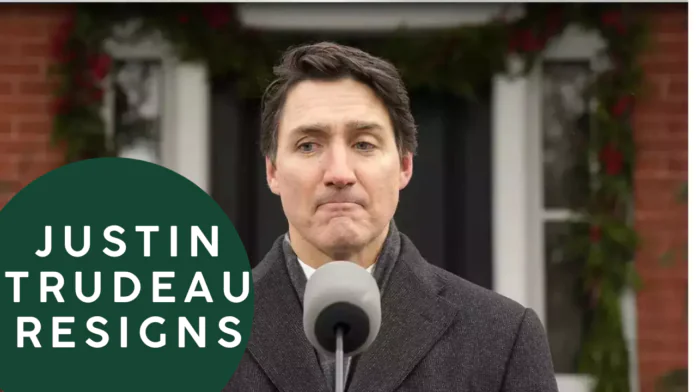Justin Trudeau resigns as a Canada’s Prime Minister and leader of the Liberal Party has sent shockwaves through Canadian politics and raised critical questions about the future of India-Canada relations. With strained ties under Trudeau’s leadership, his departure could signal a turning point for bilateral relations. This article explores the implications of Trudeau’s resignation, the potential shifts in Canada’s foreign policy, and what it means for India.
1. Why Did Justin Trudeau Resign as Canada’s Prime Minister?
Justin Trudeau announced his resignation on January 6, 2025, citing personal and political reasons. His decision comes amid declining popularity, internal party challenges, and a stalled Parliament. With the Liberal Party facing a potential no-confidence vote, Trudeau’s resignation aims to pave the way for a new leader to steer the party through turbulent times.
2. What Happens Next in Canadian Politics After Trudeau’s Resignation?
With Parliament prorogued until March 24, 2025, the opposition’s efforts to bring a no-confidence motion are on hold. The Liberal Party is expected to elect a new leader within two months, but the process could take longer. Prominent contenders include former Finance Minister Chrystia Freeland, Transport Minister Anita Anand, and former central banker Mark Carney.
However, the Liberals face an uphill battle. They are 17 seats short of a majority, and the New Democratic Party (NDP) has declined to offer support. If the government loses a confidence vote, it could trigger a federal election, further complicating the political landscape.
3. Why Were India-Canada Relations Strained Under Justin Trudeau?
India-Canada relations hit an all-time low under Trudeau’s leadership, primarily due to his allegations of Indian involvement in the killing of Khalistani separatist Hardeep Singh Nijjar in British Columbia. Trudeau claimed to have “credible evidence” of Indian agents’ involvement, a charge India vehemently denied, calling it “motivated” and “preposterous.”
The diplomatic row escalated when India expelled Canadian diplomats and suspended visa services for Canadian citizens. Trudeau’s accusations were seen as an attempt to appease the Sikh diaspora in Canada, many of whom are staunch supporters of the Liberal Party. However, the lack of concrete evidence further strained bilateral ties.
4. How Will Trudeau’s Resignation Impact India-Canada Relations?
Trudeau’s resignation opens the door for a potential reset in India-Canada relations. A new Liberal leader or a Conservative government under Pierre Poilievre could adopt a more pragmatic approach. While Trudeau’s confrontational stance alienated India, Poilievre has expressed a desire to restore a “professional relationship” with New Delhi.
However, Poilievre’s past actions, such as skipping a Diwali event in 2022, have raised concerns among the Indian diaspora. India will closely monitor Canada’s leadership transition, as the next Prime Minister’s approach will determine the trajectory of bilateral ties.
5. What Are the Economic Implications of Trudeau’s Resignation for India-Canada Trade?
Under Trudeau, Canada-India trade flourished, reaching $8.4 billion in 2024. Key exports included minerals, potash, and industrial chemicals, while India supplied pharmaceuticals, electronics, and precious stones. However, Trudeau’s resignation could disrupt ongoing trade negotiations, such as the Comprehensive Economic Partnership Agreement (CEPA).
A Conservative government might prioritize economic collaboration, potentially easing tensions. However, its selective immigration policies could alienate Indian students and workers, who have been a significant part of Canada’s economy.
6. Who Could Replace Justin Trudeau as Canada’s Next Prime Minister?
The Liberal Party is expected to elect a new leader within two months. Prominent contenders include:
- Chrystia Freeland: Former Finance Minister and Deputy Prime Minister.
- Anita Anand: Transport Minister with a strong track record in public service.
- Mark Carney: Former Governor of the Bank of Canada and Bank of England.
The new leader will face the challenge of uniting the party and addressing Canada’s domestic and international challenges.
7. What Does Trudeau’s Resignation Mean for Canada’s Global Standing?
Trudeau’s resignation could signal a shift in Canada’s role on the global stage. The next government will need to navigate challenges such as U.S. President-elect Donald Trump’s tariff threats, climate financing, and trade cooperation. A Conservative government might adopt a more populist approach, potentially impacting Canada’s stance on immigration and environmental sustainability.
8. Will Canada’s New Leadership Improve Relations with India?
India will closely watch Canada’s leadership transition. While Trudeau’s confrontational stance created significant challenges, a new leader could seek to balance economic interests with diplomatic reconciliation. However, the Conservative Party’s stricter immigration policies and nationalist fervor could complicate efforts to rebuild trust.
9. What Are the Key Challenges for India-Canada Relations Moving Forward?
The key challenges include:
- Addressing the diplomatic fallout from the Nijjar controversy.
- Restoring trust and confidence between the two nations.
- Balancing economic collaboration with political differences.
- Navigating the impact of Canada’s immigration policies on the Indian diaspora.
10. Conclusion: A New Chapter for India-Canada Relations
Justin Trudeau’s resignation marks the end of an era in Canadian politics and presents an opportunity for a reset in India-Canada relations. While the strained ties under Trudeau’s leadership created significant challenges, the next government has the potential to chart a new course. Whether through diplomatic reconciliation or pragmatic economic collaboration, the future of this relationship will depend on the choices made by Canada’s new leadership.
For India, the priority will be to engage constructively with Canada’s next government while safeguarding its strategic interests. As the world watches this transition, the stakes for both nations remain high.


